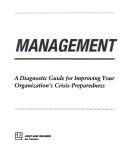Book
ISBN: 9782296074125 Year: 2008 Publisher: Paris : Harmattan,
Abstract | Keywords | Export | Availability | Bookmark
 Loading...
Loading...Choose an application
- Reference Manager
- EndNote
- RefWorks (Direct export to RefWorks)
Book
ISBN: 3957104165 3985420424 Year: 2022 Publisher: Baden-Baden : Nomos,
Abstract | Keywords | Export | Availability | Bookmark
 Loading...
Loading...Choose an application
- Reference Manager
- EndNote
- RefWorks (Direct export to RefWorks)
Entwicklungen wie die digitale Transformation, der demografische Wandel und die zunehmende Globalisierung stellen Organisationen und die darin tätigen Führungskräfte kontinuierlich vor neue Herausforderungen. Die jährlich erscheinende Austrian Management Review schlägt eine Brücke zwischen Theorie und Praxis. Sie versteht sich als Dialogforum, das die Rigorosität der Wissenschaft und die Relevanz der Unternehmenspraxis verbindet. In Kooperation mit Unternehmensverantwortlichen werden neueste Ergebnisse aus der Lern- und Forschungswerkstatt Universität aufgearbeitet und Lösungsansätze diskutiert, wie Unternehmen fit für die strategischen Herausforderungen einer ungewissen Zukunft gemacht werden können.
Book
ISBN: 1506328695 9781506328690 Year: 2020 Publisher: Los Angeles: Sage,
Abstract | Keywords | Export | Availability | Bookmark
 Loading...
Loading...Choose an application
- Reference Manager
- EndNote
- RefWorks (Direct export to RefWorks)
Book
ISBN: 0195328728 9780195328721 Year: 2008 Publisher: New York (N.Y.): Oxford university press,
Abstract | Keywords | Export | Availability | Bookmark
 Loading...
Loading...Choose an application
- Reference Manager
- EndNote
- RefWorks (Direct export to RefWorks)

ISBN: 9781555425630 1555425631 Year: 1993 Publisher: San Francisco (Calif.): Jossey-Bass,
Abstract | Keywords | Export | Availability | Bookmark
 Loading...
Loading...Choose an application
- Reference Manager
- EndNote
- RefWorks (Direct export to RefWorks)
Book
Abstract | Keywords | Export | Availability | Bookmark
 Loading...
Loading...Choose an application
- Reference Manager
- EndNote
- RefWorks (Direct export to RefWorks)
Book
ISBN: 9791037018588 Year: 2021 Publisher: Paris : Hermann,
Abstract | Keywords | Export | Availability | Bookmark
 Loading...
Loading...Choose an application
- Reference Manager
- EndNote
- RefWorks (Direct export to RefWorks)
"Comment diriger et gouverner dans notre univers de risque ? De crises sanitaires en bulles financières à répétition, de tensions géopolitiques en catastrophes climatiques, de bouleversements sociétaux en ruptures technologiques, les décideurs sont aujourd'hui confrontés à des chocs permanents qui rendent l'environnement moins prévisible qu'autrefois. Pour angoissante qu'elle soit, cette situation est également une chance : le risque n'est pas seulement une menace ; il est aussi - et surtout - une opportunité de progrès et d'apprentissage par l'essai, dont l'échec fait partie, à condition bien sûr de développer une culture de responsabilisation et une gouvernance capables d'en tirer parti. S'inspirant de la figure du jazzman, Xavier Durand invite les décideurs à abandonner le costume d'un chef d'orchestre persuadé de connaître tous les mouvements à l'avance, et plaide pour l'émergence de leaders éclairés, conscients de leur vulnérabilité et de leurs limites, aptes à composer leur partition en temps réel, en écho aux réflexions de leurs collaborateurs et en résonance avec le tempo si particulier de notre époque. En découle une philosophie d'action permettant d'envisager autrement les problématiques de gestion des crises.".
Book
Year: 2023 Publisher: Göteborg, Sweden : Nordicom, University of Gothenburg,
Abstract | Keywords | Export | Availability | Bookmark
 Loading...
Loading...Choose an application
- Reference Manager
- EndNote
- RefWorks (Direct export to RefWorks)
This edited volume compares experiences of how the Covid-19 pandemic was communicated in the Nordic countries - Denmark, Finland, Iceland, Norway, and Sweden. The Nordic countries are often discussed in terms of similarities concerning an extensive welfare system, economic policies, media systems, and high levels of trust in societal actors. However, in the wake of a global pandemic, the countries' coping strategies varied, creating certain question marks on the existence of a "Nordic model". The chapters give a broad overview of crisis communication in the Nordic countries during the first year of the Covid-19 pandemic by combining organisational and societal theoretical perspectives and encompassing crisis response from governments, public health authorities, lobbyists, corporations, news media, and citizens. The results show several similarities, such as political and governmental responses highlighting solidarity and the need for exceptional measures, as expressed in press conferences, social media posts, information campaigns, and speeches. The media coverage relied on experts and was mainly informative, with few critical investigations during the initial phases. Moreover, surveys and interviews show the importance of news media for citizens' coping strategies, but also that citizens mostly trusted both politicians and health authorities during the crisis. This book is of interest to all who are looking to understand societal crisis management on a comprehensive level. The volume contains chapters from leading experts from all the Nordic countries and is edited by a team with complementary expertise on crisis communication, political communication, and journalism, consisting of Bengt Johansson, Øyvind Ihlen, Jenny Lindholm, and Mark Blach-Ørsten. .
Book
Year: 2013 Publisher: Paris (5 Rue Laromiguière 75005) : Dunod,
Abstract | Keywords | Export | Availability | Bookmark
 Loading...
Loading...Choose an application
- Reference Manager
- EndNote
- RefWorks (Direct export to RefWorks)
Book
Year: 2020 Publisher: Washington, D.C. : International Monetary Fund,
Abstract | Keywords | Export | Availability | Bookmark
 Loading...
Loading...Choose an application
- Reference Manager
- EndNote
- RefWorks (Direct export to RefWorks)
To better respond to the unprecedented demand from the membership for financing and crisis support in response to the covid-19 pandemic, there is a temporary postponement of staff's work on Article IV consultations and mandatory Financial Stability Assessments. To ensure the postponement has no adverse impact of members' compliance with their obligations, the deadlines for upcoming Article IV consultations and for discussions with currency unions have been extended by 6 months. This paper provides additional background on these temporary arrangements.

 Search
Search Feedback
Feedback About UniCat
About UniCat  Help
Help News
News